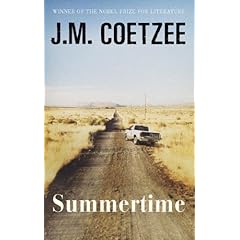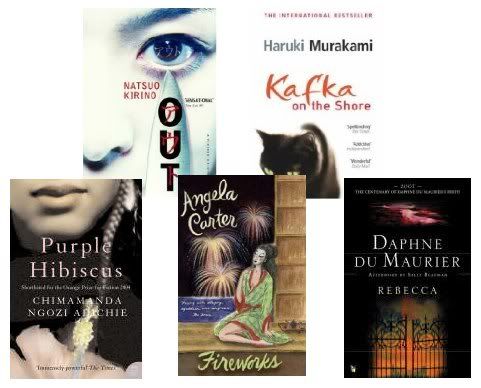 And so, my Booker shortlist (2009) journey continues with Coetzee's fictional memoir, which completes the trilogy, already containing Boyhood and Youth. I haven't read either of them, so, I wasn't sure what to expect with Summertime, although my experience with Coetzee told me it wouldn't be a very "summertime" book. Needless to say, I was right!
However, this is a well-written, clever book, which comes across as part fictional, part real. A research student, Mr. Vincent, is planning to write a biography of the Nobel Prize winner after his death. After scouring the late author's journals, and reading his books, Vincent interviews five people he deems important to Coetzee in the 1970s - the time this novel focuses on.
And so, my Booker shortlist (2009) journey continues with Coetzee's fictional memoir, which completes the trilogy, already containing Boyhood and Youth. I haven't read either of them, so, I wasn't sure what to expect with Summertime, although my experience with Coetzee told me it wouldn't be a very "summertime" book. Needless to say, I was right!
However, this is a well-written, clever book, which comes across as part fictional, part real. A research student, Mr. Vincent, is planning to write a biography of the Nobel Prize winner after his death. After scouring the late author's journals, and reading his books, Vincent interviews five people he deems important to Coetzee in the 1970s - the time this novel focuses on.
The novel is essentially paraphrasing the interviews, with the interviewees comments interlaced with the interviewer's questions, so that it reads as a conversation. Through these conversations, we get a glimpse into the life and times of John C (see what I did there?), as he perceives himself through the eyes of his cousins, friends, lovers and acquaintances.
Coetzee's well-known to be a recluse, and this novel affirms that, with its self-deprecating prose, and harsh insights - some of which may be true, and most of which is pure fabrication!
"Coetzee was never a popular writer. By that I do not simply mean that his books did not sell well. I also mean that the public never took him to their collective heart. There was an image of him in the public realm as a cold and supercilious intellectual, an image he did nothing to dispel. Indeed one might even say he encouraged it.
Julia, the first interviewee, refers to John as a "cold fish", while his cousin thinks he's "stuck up". A lady he was supposedly in love with says, "Not sexless. Solitary. Not made for conjugal life. Not made for the company of women," while one of his teaching partners describes his writing as being far from great: "Too cool, too neat, I would say. Too easy, too lacking in passion. That is all."
However, while this is almost a fascinating revelation on Coetzee, it does raise a number of pertinent questions: Just because Coetzee won the Nobel Prize, does he deserve the attention he's getting? Specially, as Vincent is looking for a "story", and all he's getting is snippets that show Coetzee's unsocial, slightly disembodied personality.
And, what drives us to look after our parents, after a certain age? Is it a responsibility? Is it a necessity? And, can we run away from that filial duty? Or, do we succumb to it? More importantly, is it about love? Or, the right thing to do?
Again, in a typically Coetzee fashion, he touches upon life in South Africa in the 1970s, as the social climate was slowly changing, but the gap between the Afrikaner and the white man was still vast. He talks of how people fled the country, in "stormy times", and how people returned when they had nowhere else to go. There's also an element of the interests of black students, and white students, and how they differ - specially when you toss in the "radical black students".
It's a thought-provoking gentle book - not as hard to read as some of his other books - but, it still draws you in, and lets you peep into the heart and mind of someone who's almost considered socially inept, despite his genius. He might not be the most loveable person out there, but his self-criticism, romanticism, affection and determination really grew on me, and I half-wish I had the opportunity of knowing him, and arguing with him: principles over pragmatism. That makes two of us.
Rating: 4.5
 This is the first book on the Booker shortlist that I've tackled this year, and I have to admit that my opinion on the book remains ambivalent. Having finished
This is the first book on the Booker shortlist that I've tackled this year, and I have to admit that my opinion on the book remains ambivalent. Having finished  I stumbled upon this
I stumbled upon this 
 Set in Papua New Guinea, in the 1990s, this book is narrated by Matilda, an adolescent, who witnesses the horrors of civil war first hand. The book opens with many people fleeing the island, and it being lost to the outside world, as the 'redskins' (the government soldies) and the 'rambos' (rebels) advances.
Set in Papua New Guinea, in the 1990s, this book is narrated by Matilda, an adolescent, who witnesses the horrors of civil war first hand. The book opens with many people fleeing the island, and it being lost to the outside world, as the 'redskins' (the government soldies) and the 'rambos' (rebels) advances. Which child would not like a book about a marvelous chocolate factory, owned by Willie Wonka, which had oompa-loompas as workers, a chocolate lake, an "invention" room, and the "television" room. The ideas were so surreal that they were fantastic, and I yearned to be Charlie.
Which child would not like a book about a marvelous chocolate factory, owned by Willie Wonka, which had oompa-loompas as workers, a chocolate lake, an "invention" room, and the "television" room. The ideas were so surreal that they were fantastic, and I yearned to be Charlie.
 This might be a favorite, as it's the one Roald Dahl I never possessed (until three years ago, that is). I used to go to the library with my mum, and attempted seeking out this book as many times as possible, so much so that the librarian suggested I buy the book.
This might be a favorite, as it's the one Roald Dahl I never possessed (until three years ago, that is). I used to go to the library with my mum, and attempted seeking out this book as many times as possible, so much so that the librarian suggested I buy the book. 
 I wasn't planning on reading the entire
I wasn't planning on reading the entire  It's the 1860s, and Lant Street, a dodgy street near Southwark Bridge, is inhabited by petty thieves, small-time burglars, piddling swindlers and the like. Here lives Sue Trinder, a seventeen year old, with Mrs. Sucksby (her guardian), and Mr. Ibbs (a man who fences stolen items), along with a bunch of infants, unwanted in this world, who Mrs. Sucksby brings up and introduces to the world of small crime; and, some adolescent pickpockets (or, "fingersmiths", if you like).
It's the 1860s, and Lant Street, a dodgy street near Southwark Bridge, is inhabited by petty thieves, small-time burglars, piddling swindlers and the like. Here lives Sue Trinder, a seventeen year old, with Mrs. Sucksby (her guardian), and Mr. Ibbs (a man who fences stolen items), along with a bunch of infants, unwanted in this world, who Mrs. Sucksby brings up and introduces to the world of small crime; and, some adolescent pickpockets (or, "fingersmiths", if you like).